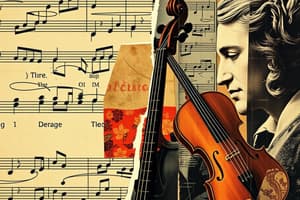Podcast
Questions and Answers
What does the term 'adagio' mean in musical terminology?
What does the term 'adagio' mean in musical terminology?
- At ease or slowly (correct)
- A type of dance
- A vocal composition
- Fast tempo
What is an aeromelodicon?
What is an aeromelodicon?
A patented keyboard instrument invented in the 19th century.
An air or ayre is synonymous with the Italian aria.
An air or ayre is synonymous with the Italian aria.
True (A)
What does 'aleatory' refer to in music?
What does 'aleatory' refer to in music?
What does 'allegro' mean?
What does 'allegro' mean?
What is an alto voice?
What is an alto voice?
An anthem is a sacred vocal work of the __________ church.
An anthem is a sacred vocal work of the __________ church.
What does the term 'antiphon' refer to?
What does the term 'antiphon' refer to?
Define aria in the context of opera.
Define aria in the context of opera.
What is a ballade?
What is a ballade?
A ballad opera is a form of English drama that includes plays without any singing.
A ballad opera is a form of English drama that includes plays without any singing.
What voice type is referred to as a baritone?
What voice type is referred to as a baritone?
What does the term 'basso continuo' mean?
What does the term 'basso continuo' mean?
A bolero is a Spanish dance in __________ time.
A bolero is a Spanish dance in __________ time.
What is a canon in music?
What is a canon in music?
Define cantata.
Define cantata.
What is a cantor responsible for in religious contexts?
What is a cantor responsible for in religious contexts?
What does 'cantus firmus' mean?
What does 'cantus firmus' mean?
What is a canzonetta?
What is a canzonetta?
What is the definition of caprice or capriccio?
What is the definition of caprice or capriccio?
What is a catch in music?
What is a catch in music?
What is a celesta?
What is a celesta?
What is chamber music?
What is chamber music?
What does 'chorale' typically refer to?
What does 'chorale' typically refer to?
Flashcards are hidden until you start studying
Study Notes
Classical Music Terms
-
Adagio: Italian term meaning 'at ease' or 'slowly'; indicates a slow tempo for a piece or movement.
-
Aeromelodicon: A 19th-century keyboard instrument that failed to gain popularity despite being patented.
-
Air or Ayre: A song-like tune for instruments or voice, related to the French 'aire de cour' and Italian aria; evolved in the operatic context.
-
Aleatory: Contemporary music involving chance in composition or performance; derived from Latin for 'dice'.
-
Allegro: Italian for 'happy'; signifies a fast tempo and is also used to name a movement within a composition.
-
Alto: Refers to a high male voice or the second highest voice in vocal music, applicable to both genders; also describes instruments in a similar range.
-
Anthem: A sacred vocal piece commonly found in English-speaking churches, serving as the equivalent to the Latin motet.
-
Antiphon: A short passage, often from psalms, sung in response format, highlighting the antiphonal style of performance.
-
Aria: Extended vocal solo primarily in opera or oratorio, often structured in three sections; prominent form includes A-B-A da capo aria from the 18th century.
-
Ballade: A dramatic piano composition, first notably used by Frédéric Chopin.
-
Ballad Opera: A form of English drama featuring alternating spoken dialogue and songs.
-
Baritone: Male voice type that sits between bass and tenor ranges.
-
Basso Continuo: Common harmonic support from a keyboard or lute, indicated through bass notes and figures; closely related to figured bass.
-
Bolero: A traditional Spanish dance characterized by its triple time signature.
-
Canon: Musical technique of repeating a melody with a delay, leading to overlapping presentations; also refers to a composition using this technique.
-
Cantata: Extended vocal work for one or more voices with instrumental accompaniment; means 'sung' in Italian.
-
Cantor: A solo singer in Christian and Jewish liturgy responsible for unaccompanied passages.
-
Cantus Firmus: Term for the fixed melody, particularly the tenor line in 15th-century polyphony.
-
Canzona (Canzoni): Initially a term for a poem, later adapted for its musical setting, and often a short instrumental piece incorporating figured elements.
-
Canzonetta: A 'little song' in Italian, specifically referring to vocal music settings of canzoni.
-
Caprice or Capriccio: A flexible style of music, either vocal or instrumental, not conforming to strict categories; similar to a fantasia.
-
Catch: Originally a vocal round, the term evolved to denote humorous and often risqué compositions.
-
Celesta: A keyboard percussion instrument, invented in the late 19th century, where metal plates are struck; famously utilized by Tchaikovsky.
-
Chamber Music: Originally designed for intimate settings (like a chamber), this form applies to any smaller scale concert works.
-
Chorale/Choral: Refers to hymn tunes from the German Protestant tradition, often utilized by composers like Bach in organ and vocal works.
Studying That Suits You
Use AI to generate personalized quizzes and flashcards to suit your learning preferences.



